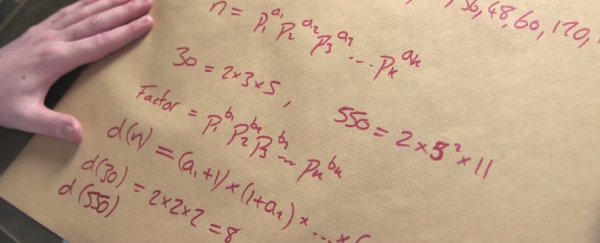
We hear a lot about how awesome prime numbers are - those shiny unicorns of the maths world that are only divisible by themselves and one. But the latest episode of Numberphile is here to show you, with more enthusiasm than we've ever managed to muster about mathematics, that there's also such a thing as anti-prime numbers. And they can be just as awesome.
To start with though, let's talk about primes for a second, because they're pretty special numbers. Other than their purity when it comes to being divisible, they're also the 'atoms' of the mathematics world, because all other numbers are made up of factors of prime numbers.
That means that if a number isn't a prime number, it's going to be divisible by a prime number. Which somehow reminds me that everything is right in the world.
But okay, what's an anti-prime number? As James Grimes explains in this episode of Numberphile, these are what are called highly composite numbers, which was a term coined by the Indian mathematician Srinivasa Ramanujan back in 1915, and they're basically numbers that can be divided by a whole lot of other numbers.
That might not sound that exciting or special, but they're actually incredibly useful. In fact, Plato's favourite number was a highly composite number, or an anti-prime.
According to the ancient Greek philosopher, 5,040 was the best number that exists, because there are 60 different numbers that it can be divided by.
This means that, if you had a city with a population of 5,040 people, for example, it would be easy to divide them up all neatly into all different kinds of groups, and to Plato, that was a superior trait for a number to have.
But there are a lot of other cool things you can do with these anti-primes, and we're going to let you watch the video above to find them out - because there's no way we can explain all their magical characteristics, and the tricks you do with them, anywhere near as well as Grimes does with some butcher paper, red marker, and a whole lot of enthusiasm.
Enjoy.
